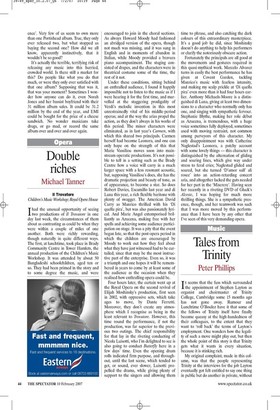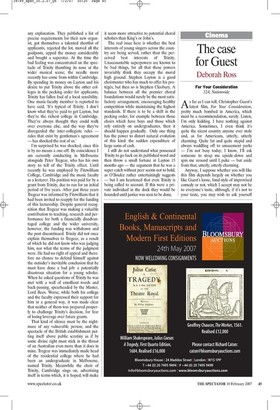Tales from Trinity Peter Phillips
It seems that the fuss which surrounded the appointment of Stephen Layton as organist and choirmaster of Trinity College, Cambridge some 15 months ago has not gone away. Rumour and Lunchtime O'Boulez have it that some of the fellows of Trinity itself have finally become queasy at the high-handedness of their colleagues, to the extent that they want to 'roll back' the terms of Layton's employment. One wonders how the legality of such a move might play out, but then the whole point of this story is that Trinity gets what it wants in every situation, because it is stinking rich.
My original complaint, made in this column, was that the people representing Trinity at the interviews for the job Layton eventually got felt entitled to say one thing in public but do another in private, without any explanation. They published a list of precise requirements for their new organist, got themselves a talented shortlist of applicants, rejected the lot, moved all the goalposts, upped the money considerably and bought a superstar. At the time the bad feeling was concentrated on the spectacle of Trinity thumbing its nose at the wider musical scene; the needle more recently has come from within Cambridge. By spending its money on Layton and his desire to put Trinity above the other colleges in the pecking order for applicants, Trinity has fallen foul of a local sensibility. One music-faculty member is reported to have said, 'It's typical of Trinity. I don't know what they've paid to get Layton, but they're the richest college in Cambridge. They've always thought they could walk over everyone else, and the way they've disregarded the inter-collegiate rules — rules that exist by gentleman's agreement — has shocked the rest of us.'
I'm surprised he was shocked, since this is by no means a one-off. By coincidence I am currently conducting in Melbourne alongside Peter Tregear, who has his own story to tell of the Trinity effect. Until recently he was employed by Fitzwilliam College, Cambridge and the music faculty as a lecturer. His position was paid for by a grant from Trinity, due to run for an initial period of five years. After just three years Tregear was informed by Fitzwilliam that it had been invited to reapply for the funding of this lectureship. Despite general recognition that Tregear was making a valuable contribution to teaching, research and performance for both a financially disadvantaged college and the wider university, however, the funding was withdrawn and the post discontinued. Trinity did not once explain themselves to Tregear, as a result of which he did not know who was judging him, nor what the terms of the judgment were. He had no right of appeal and therefore no chance to defend himself against the outsider's inevitable conclusion that he must have done a bad job: a potentially disastrous situation for a young scholar. When he asked questions of Trinity he was met with a wall of emollient words and buck-passing, spearheaded by the Master, Lord Rees. Worse, while both his college and the faculty expressed their support for him in a general way, it was made clear that neither of them was prepared properly to challenge Trinity's decision, for fear of losing leverage over future grants.
That kind of silence must be the nightmare of any vulnerable person; and the spectacle of the British establishment putting itself above public scrutiny as if by some divine right must stick in the throat of an Australian even more than it does in mine. Tregear was immediately made head of the residential college where he had been an undergraduate in Melbourne, named Trinity. Meanwhile the choir of Trinity, Cambridge sings on, advertising itself in terms which, it is hoped, will make it seem more attractive to potential choral scholars than King's or John's.
The real issue here is whether the best interests of young singers across the country are being served, rather than the perceived best interests of Trinity. Unaccountable superpowers are known to be bad things, for all that these powers invariably think they occupy the moral high ground. Stephen Layton is a good choirmaster who has much to offer his protégés, but then so is Stephen Cleobury. A balance between all the premier choral foundations would surely be the most satisfactory arrangement, encouraging healthy competition while maintaining the highest standards. If there is to be a shift in the pecking order, for example between those choirs which have boys and those which rely entirely on undergraduates, then it should happen gradually. Only one thing has the power to distort natural evolution of this kind: the sudden expenditure of large sums of cash.
I still do not understand what possessed Trinity to go back on its published word and then throw a small fortune at Layton 15 months ago — the argument that he was a super-catch without peer seems not to hold, as O'Boulez rather entertainingly suggests — but I am heartened that even Trinity is being called to account. If this were a private individual in the dock they would be hounded until justice was seen to be done.














































 Previous page
Previous page